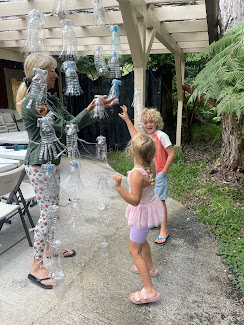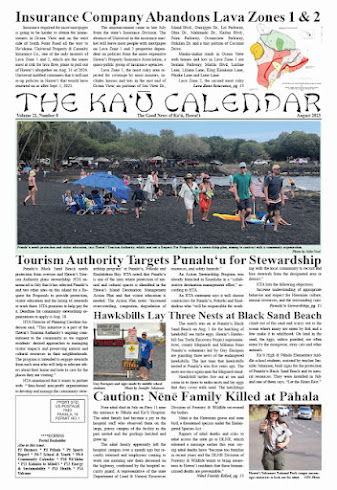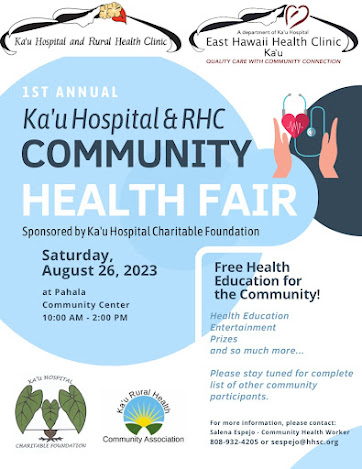 |
George Tamihana Nuku's Maori-inspired Bottled Ocean participatory exhibits have taken him around the world and now to Volcano Art Center for Changing Oceans, Changing Minds. Photo from Nuku |
 |
| A Maori from New Zealand, George Nuku, is installing his Changing Oceans, Changing Minds show at the Nialulani Campus of Volcano Art Center. |
Changing Oceans, Changing Minds will be open daily, 10 a.m. – 4 p.m. from August 26 through September 10. An opening reception takes place on Friday, August 25 from 4 p.m. – 6
p.m. in Dietrich Varez Hall with Nuku giving an artist's talk.
Through the use of thousands of re-purposed empty plastic bottles and pieces of reused carved transparent plexiglass, the project aims to create a symbolic representation of the island of Hawai‘i, surrounded by plastic marine life and sea birds.
 |
| Michelle Buck with April and Cedar Corrao at Volcano Art Center to make plastic bottle art. |
A statement from Volcano Art Center says, "The participatory aspect is integral to people forming a personal cultural connection with plastic as a material and humanity’s inherent genealogical inter-relationship. The result is participants see themselves reflected in the pollution as a pathway to affecting a resolution. The site-specific, installation directed by Nuku and his team will rely on engagement from local volunteers in a spirit of collaboration, innovation, and exchange. Local participation and engagement in the process of creation allow interconnectedness with the participants, materials, and environment. The resulting artistic creations give value to otherwise often discarded plastics. Nuku feels that if we value our creations, we are unlikely to discard them, thus leaving our environments -including the ocean- healthier and valued."
Nuku has created over 20 large-scale projects of this nature around the world using plastics, such as styrene and recycled bottles, "in his powerful and provocative artwork. The opportunity to present this project in Hawai‘i connects his Polynesian heritage to the future of our environment. Nuku will work with our island community to explore the Native Hawaiian and other Polynesian community’s ocean-based identities as they intersect with the changing ocean. Nuku’s philosophy is that we must begin seeing plastics not as garbage, but as valuable, beautiful, and even sacred materials."
Nuku said, “We must transform our relationship with plastic and the environment if we want to preserve our environment.”
To read comments, add your own, and like this story, see facebook.com/kaucalendar. See latest print edition at kaucalendar.com, in the mail and on stands.
Here are the County Boards seeking applications for membership, related to Kaʻū. Environmental Management Commission, Fire Board of Appeals, Fire Commission, Game Management Advisory Commission, Liquor Commission, Liquor Control Adjudication Board, Pension Board, Police Commission, Public Access, Open Space and Natural Preservation Commission, Tax Board of Review, Transportation Commission, Windward Planning Commission, Youth Commission.
While the Windward Planning Commission covers all of Kaʻū, Puna and more, the Leeward Planning Commission, in part, covers South Kona, which includes Miloli‘i.
To read comments, add your own, and like this story, see facebook.com/kaucalendar. See latest print edition at kaucalendar.com, in the mail and on stands.
A CAMPAIGN TO EDUCATE ABOUT COMMON SIGNS OF A STROKE has been launched by the state Department of Health. It also emphasizes the importance of calling 911 immediately, especially since stroke care starts in the ambulance.
"Stroke is the number one cause of chronic disability and the third leading cause of death in Hawai‘i. Stroke was responsible for 943 deaths statewide in 2021 and has been rising annually since 2016 when 675 lives were lost to this serious medical condition. A stroke occurs when blood flow through an artery to the brain is cut off either by a blockage or because the artery ruptures and bleeds into the brain tissue. People are experiencing strokes at increasingly younger ages each year. Strokes are a serious medical emergency and must be treated right away," advised the Department of Health.
Neurointensivist, Dr. Matt Koenig at Queens Medical Center, said “Doctors have a greater chance of successfully treating a stroke patient if treatment is started in the first 60-90 minutes of a stroke. That is why patient transportation by ambulance is important.” During the December 2022 Hawai‘i Stroke Coalition Symposium, he said. Every minute that goes by, you're losing about two million brain cells. Don't overthink things like, "Can I drive faster to the hospital myself? Don't drive to the hospital, and don't wait. Instead, call 911. Stroke care starts in the ambulance.”
Common signs of a stroke can be remembered by the acronym BE FAST”:
B - Balance loss. Is there a sudden loss of balance or dizziness?
E - Eyesight problems. Is the person experiencing a sudden loss of vision in one or both eyes, blurriness or double vision?
F - Face drooping. Is one side of the person's face drooping or uneven?
A - Arm weakness. Is the person experiencing weakness or numbness in one arm or is unable to raise both arms?
S - Speech difficulty. Is the person's speech slurred or hard to understand?
T - Time to call 9-1-1. Call 911 immediately if someone suddenly has one or more of these stroke signs.
 |
| AFTER DARK IN THE PARK on Tuesday evening at Hawai‘i Volcanoes National Park features this author. See more in The Kaʻū Calendar of Events at http://kaunewsbriefs.blogspot.com/2023/08/the-kau-calendar-of-events.html |
The following are ways to help prevent a stroke:
Choose healthy foods and drinks daily
Maintain a healthy weight;
Exercise regularly;
Regularly check and control your blood pressure;
Quit smoking/vaping; and
Properly manage medical conditions such as high blood pressure, high cholesterol, heart disease and diabetes.


.jpg)





.jpg)

